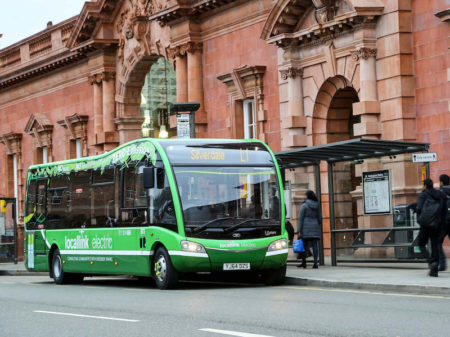Nottingham air quality plan gets government green light
Nottingham is to progress schemes to clean up air pollution in the city without charging vehicles after securing approval from the Government.

The council said this summer that citywide measures already under way to improve air quality meant a clean air zone is no longer being considered in Nottingham
The city was one of five – also including Birmingham, Derby, Leeds and Southampton – that were identified under the Government’s 2015 air quality plan as being required to establish a clean air zone by 2020 to help bring the UK into compliance with the Air Quality Directive target on nitrogen dioxide emissions. However, latest air quality plans, published in 2017, saw the Government backtrack on forcing such zones to be mandatory – instead placing the focus on the local authorities to make the decision themselves on the quickest way to cut NO2 emissions.
Now, Nottingham City Council says it’s become the first to get approval for its plans, which were revealed five months ago and, according to modelling, will achieve the reductions needed in two years’ time without requiring the use of a charging clean air zone.
Environment Minister Thérèse Coffey said: “I am delighted to approve Nottingham City Council’s new air quality plan. Air pollution is the top environmental risk to health in the UK and these government-funded plans will clean up the air in the city centre, protecting residents and visitors alike.
“The plans have been finalised thanks to hard work and collaboration – a brilliant example of what can be achieved when local and national government work together towards a common goal.
“We will continue to work with local authorities across the UK to improve the quality of the air we breathe.”
The council’s approach has also been welcomed by the Freight Transport Association (FTA), which said it hoped that “other cities across the country take the same common-sense attitude to clean air policies”.
As with Leeds and Southampton, Nottingham has been looking at a ‘Class B’ clean air zone – which would have affected HGVs, buses and taxis without impacting on cars and vans like the Birmingham scheme. However, the final plans cover a range of measures, including retrofitting 171 buses with technology to reduce emissions; supporting an increase in low emission taxis; and introducing a taxi rank with charging points.
Chris Yarsley, FTA’s Policy Manager for the Midlands commented: “It’s important any air quality improvement scheme is designed with the unique needs of each place in mind – what works for one city may not be suitable for another – and this result shows the authorities are listening and adapting. The decision to overturn the mandate that Nottingham must introduce a CAZ sets a welcome precedent that government will consider more tailored plans that reflect the needs of each community.”
Yarsley continued: “This is positive news for local businesses and those traveling through the city from further afield; commercial vehicles which not do meet Euro 6 requirements will no longer be faced with heavy penalties for going about their daily work in Nottingham, as was originally laid out in the planned CAZ. These vehicles are an essential part of the city’s local economy – from delivering home shopping to providing businesses with the goods and services they need to operate – and it’s crucial their vital importance is recognised throughout air quality consultations. Nottingham’s plans will produce the same air quality improvements – if not more – without penalising hard-working vehicle operators.”

















